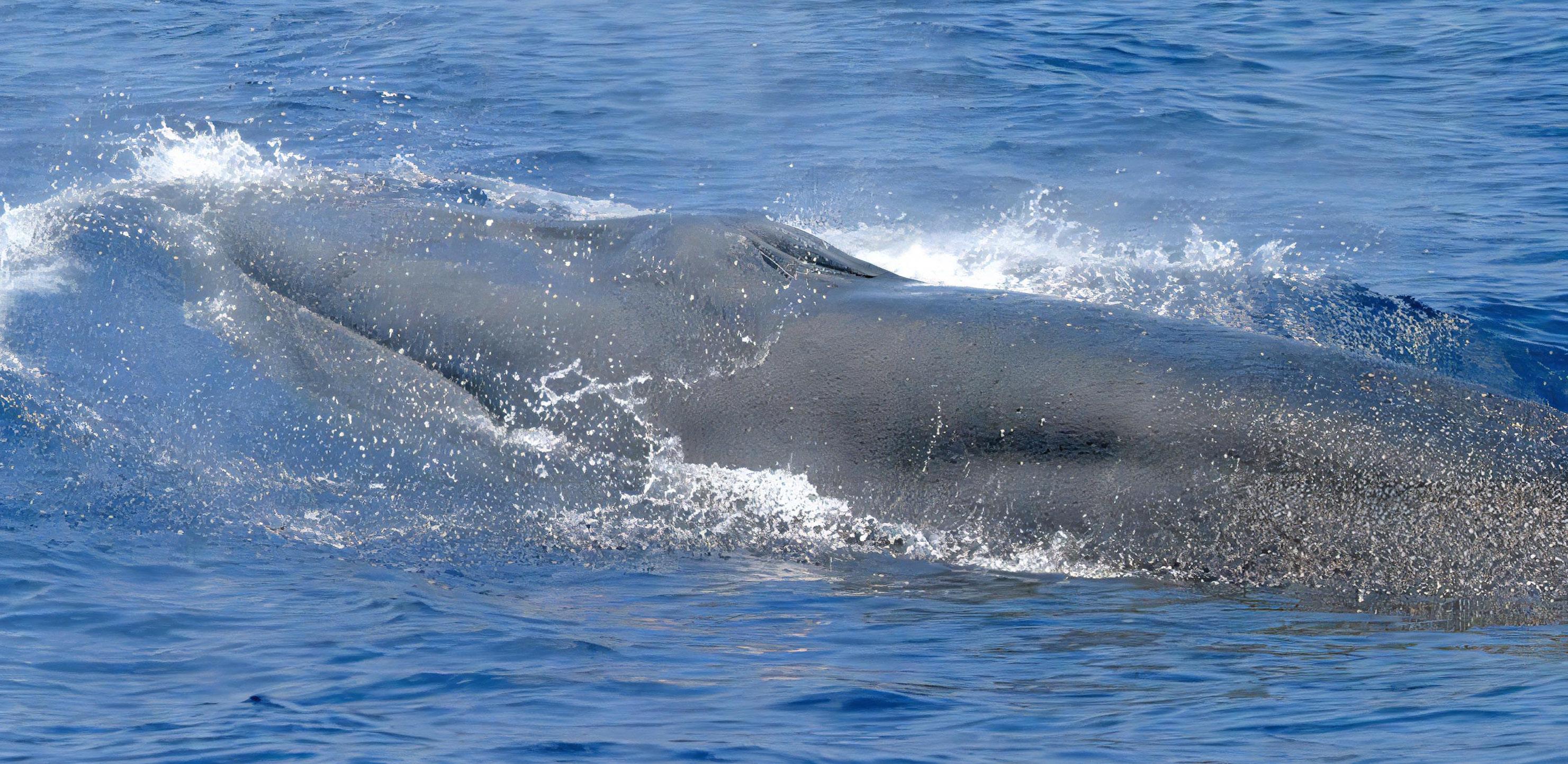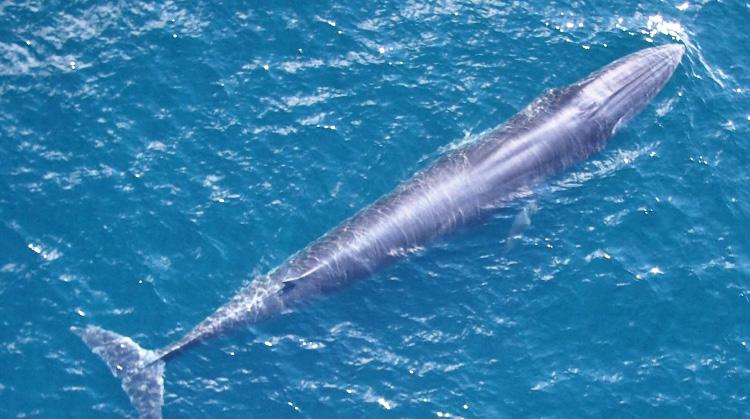
6 minute read
Rice's Whales in the Gulf of Mexico and Proposed Vessel Speed Limit
by: Aimee Bright, Vice President of Governmental/Military Affairs, Bay County Chamber of Commerce
The Gulf of Mexico is home to a diverse array of marine life, and among its inhabitants, Rice's whales (Balaenoptera ricei) stand out as one of the most enigmatic and least understood species. Earlier this year, non-government organizations brought forth a petition to the National Oceanic and Atmosphere Administration (NOAA) to implement vessel speed limit restrictions. This proposed vessel speed limit rule raised concerns about negative effects it would have on our communities, port operations, and overall economy.
Rice's Whales: An Enigmatic Subspecies
Rice's whales, named after the American marine biologist Dale W. Rice, are a relatively recent addition to the world of marine mammal research. Despite their unique status as the only resident baleen whale in the Gulf of Mexico, little is known about their biology and behavior. Initially identified as a subpopulation of Bryde’s whales, they were determined to be a distinct subspecies in 2021. Their estimated population is believed to be fewer than 100, and they are usually seen alone or in pairs, but may form larger, loose groups associated with feeding. Limited data suggest Rice's whales spend the daytime diving near the seafloor bottom and spend much of their time at night within 50 feet of the water’s surface, similar to some Bryde’s whales.
There is little information on the Rice’s whales diet, lifespan, and reproduction rates. Much of what is known is based on information from closely-related Bryde’s whales. They are uniformly dark gray on top with a pale belly. The head of a Rice's whale makes up about one quarter of its entire body length. The whale has a broad fluke, or tail, and a pointed and strongly hooked dorsal fin located about two-thirds of the way back on its body. Like other baleen whales, Rice’s whales engulf large amounts of water and strain it through baleen plates that hang inside their mouths to catch their prey. Rice's whales are likely able to reproduce every two to three years, have a gestational period of 10- 12 months, and mate year-round. According to the NOAA Fisheries website, their lifespan is unknown.

Concerns Regarding Proposed Vessel Speed Limit
The proposed rules petition was submitted by the Healthy Gulf, Natural Resources Defense Council, Center for Biological Diversity, Defenders of Wildlife, Earthjustice and the New England Aquarium in 2021. In April 2023, the “Vessel Slowdown Zone” petition receipt and request for comments was published by NOAA in Federal Register Vol. 88, No. 67. The “Zone” would implement a year-round no night-time vessel transit rule and a 10-knot vessel speed restriction within waters between 100 meters and 400 meters deep from approximately Pensacola, FL, to Tampa, FL. (plus an additional 10 kilometers around that area).
Upon discovering the proposed rule petition, the Bay County Chamber initiated a research effort to gain a deeper understanding of the potential repercussions of the rule within Bay County. This examination raised significant concerns.
Much of the Gulf of Mexico fishing grounds used by recreational and commercial fisherman would fall under the 10-knot rule. Maritime activities in Florida account for nearly 13% of the state's GDP and contributes $4.2 billion in state and local taxes. Requiring a vessel to operate at a maximum speed of 10-knots and halting nighttime vessel transits, would greatly reduce the significant impact of these activities on the state's economy.
Florida's 16 seaports, which play a vital role in both cargo and cruise operations, are responsible for adding $117.6 billion to the state's economy and supporting approximately 900,000 jobs, both directly and indirectly. Specifically, Port Panama City USA, at the local level, handles over two million tons of cargo and sustains 10,790 jobs, encompassing direct, indirect, and induced employment opportunities within the community and its surrounding region. The port's cargo operations have contributed over $57.6 million in state and local taxes, and have a substantial economic impact of $1.6 billion. Any restrictions on its operations would have widespread and far-reaching consequences.
The Bay County Chamber was also gravely concerned about the impacts this rule would have on Florida’s Joint Gulf Training Range Complex. It is the largest military training range in the continental United States and provides military training activities essential to our national security. Threats to this unique military testing and training area on, above and below the surface of the water would jeopardize Florida’s appeal to retain or attract military installations, missions, training and defense contractors. Loss of such activities would negatively affect the $96.9 billion defense related economic impact in the State.

Through its research, the Chamber concluded while protecting endangered species was important, restricting marine activity was not an effective or reasonable option. Because of limited data in regards to Rice’s whales’ population and lifespan, along with insufficient information showing vessel strikes were contributing to whale mortality rates, the Bay County Chamber Board of Directors voted to oppose the proposed vessel speed limit rule.
Stated in the letter of opposition sent to NOAA, Chamber Board members noted rather than limiting marine activity, they advocated for conducting real-time monitoring of Rice’s whales through tagging, acoustic detection and pushing location information to operators. They also specified support for development of avoidance technology, outreach/education, and increasing compliance with existing regulations to help develop effective conservation strategies for Rice’s whales.
Advocacy In Action
The Chamber notified its members of the formal commenting period for the proposed vessel speed limit rule through a Governmental Affairs Action Alert. In the alert, the Chamber provided background information and talking points so members could submit an informed statement.
Many organizations and lawmakers also led the charge and wrote letters of opposition, as well as encouraged the public to submit statements during the formal comment period. The result, over 75,000 comments were made on the issue and in October of 2023, NOAA denied the petition to implement the “Vessel Slowdown Zone”.
According to a bulletin released by NOAA, the organization said it would prioritize "other conservation actions for Rice's whales." The bulletin also affirms NOAA's alignment with the suggestions made by various commenters, advocating for educational outreach with fishermen, vessel operators, and other stakeholders to discuss voluntary protective measures before contemplating regulatory actions.
Although the current denial may be considered a "victory," the matter remains unresolved. The Chamber will stay the course in monitoring this issue and evaluating potential future consequences for Bay County.






